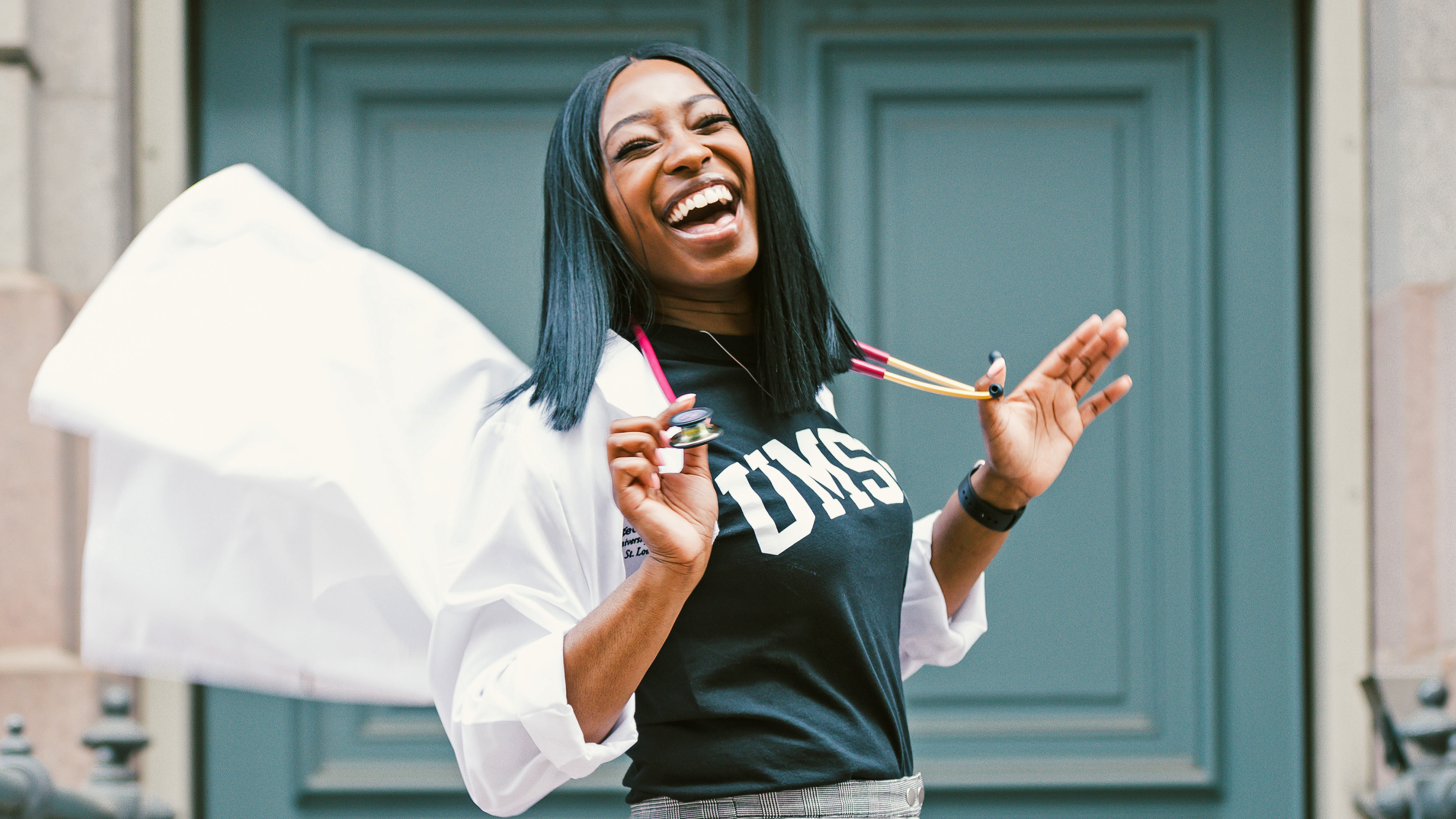
Brandi Fields hopes to combine outstanding patient care in nursing with her passion for diversity and inclusion education. (Photo by LaVell D. Monger)
She had already accepted a position elsewhere last spring when Brandi Fields got the call to pack her bags: she had been admitted into the MedStar Georgetown Nurse Residency Program in oncology.
It was just two days after her interview, and the then-soon-to-be University of Missouri–St. Louis graduate was stunned to receive a call so quickly and to hear directly from a manager straight from the hospital floor.
But Fields’ story is full of surprising turns. She had wanted to be a music producer until rehab after an ACL tear piqued her interest in health care. And despite an externship and practicum in oncology, Fields had been thinking she would be an intensive care unit nurse.
That position she had accepted was with Saint Louis University Hospital’s trauma ICU program. But while interviewing, Fields had fallen in love with the newly renovated Georgetown bone marrow transplant oncology unit.
Oncology sidled onto Fields’s radar while applying to the UMSL/Barnes Jewish Hospital Summer Externship. She put down ICU and ER on her list of interests and was stumped for a third.
She noticed oncology was an option and thought of her grandmother, whose career had been working with medical documents at the University of Kansas Medical Center radiation oncology unit. When results were announced, Fields had a confirmed spot in that last-minute addition.
“Thank you, Grandma,” she said. “I think I was meant to be here.”
The externship went a long way toward healing Fields’ self-identified imposters syndrome. She also credits her faith for buoying her through self-doubt. She struggled most during fall semester of her senior year.
“Every other day I was quitting school in my head,” said Fields, relating a time she calls her “traumatic breakdown” after struggling in a class. Fields called her mom, and they prayed together on the phone, both crying.
“I felt like I was crying even more so because I felt like I was going to be letting people down,” Fields said.
But the externship gave her confidence to apply to competitive programs.
“If I got in here, I knew I could get the top spot,” Fields said, describing how she went on to apply and get into the winter session of the SSM Health Student Nurse Internship, which snowballed into Georgetown.
Residencies appealed to Fields because she wanted a transition into “real-life nursing.” When researching programs, she was methodical and made a list of residencies, then narrowed it to those at academic, magnet-status hospitals, an American Nurses Credentialing Center certification that sets standards for superior nursing care.
But it is not the prestige that Fields finds most rewarding. Making connections with patients is her favorite part, and she takes joy in finding small ways to improve their experiences.
“Like lotioning their hands or giving them a massage where the pain is or noticing that they like ice cream at 8 p.m. before they go to bed,” she said. “Even though they might forget your name, they’ll never forget you and the impact you make in their life because it’s a vulnerable time for them being in the hospital.”
Finding ways to help is emblematic of Fields’ personality. But it was not until her final semester that she understood her impact. That’s when people started asking what they were going to do without her.
Which makes sense because Fields was constantly on campus. Even when she would intend to take a break, she wound up looking for free food or T-shirts or talking to the people that were the heart of her UMSL experience.
It is those friends she misses most. Fields participated in a plethora of student organizations and says those experiences helped prepare her for Georgetown. She also credits many faculty and staff, including Associate Director of Student Involvement Ashlee Roberts, for pushing Fields to take risks.
“In my time at UMSL, she became one of the most ambitious students I’ve had the pleasure to know,” Roberts said. “She continuously pursued opportunities to better herself, as well as her peers. I consider students opening up and letting me in their lives to nurture and develop them a privilege, and moving from a resource to an advisor to a mentor to Brandi is a professional highlight for me.”
It is also people in Washington that make the city a natural fit. Fields savors overhearing different languages, reminiscent of her childhood at international schools in the Netherlands and Turkey. When she returned in middle school, Fields was startled by the racial tension in the United States.
“In D.C., diversity is not just talked about, it’s shown,” she said.
That was also true of her UMSL experience. She was an active part of that effort as a member of groups like the Associated Black Collegians and the Chancellor’s Cultural Diversity Council, and she hopes to continue to reach her UMSL peers with an inspirational Instagram. She wants to continue social justice work and views it as an integral part of her path in nursing.
Fields sees nurse education in her future, pointing out that many schools do not always specifically emphasize practical skills like finding veins on patients with darker skin. When she started her BSN, Fields did not see many African American nursing students, but that changed dramatically after she had success in the program.
“That’s my whole purpose, to be that role model for somebody,” she said, “Okay, if I can do it, you can do it, too. And you can be better than me.”














